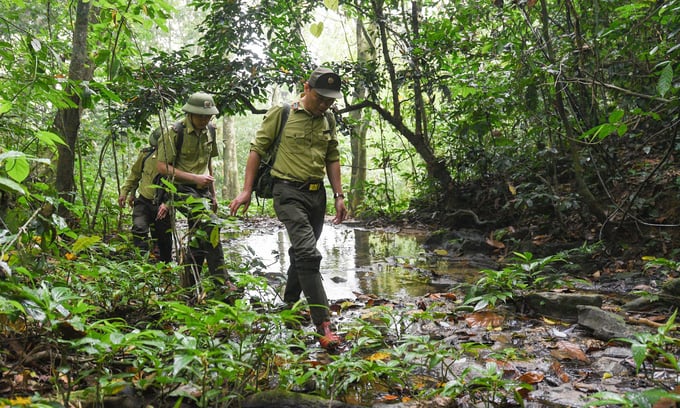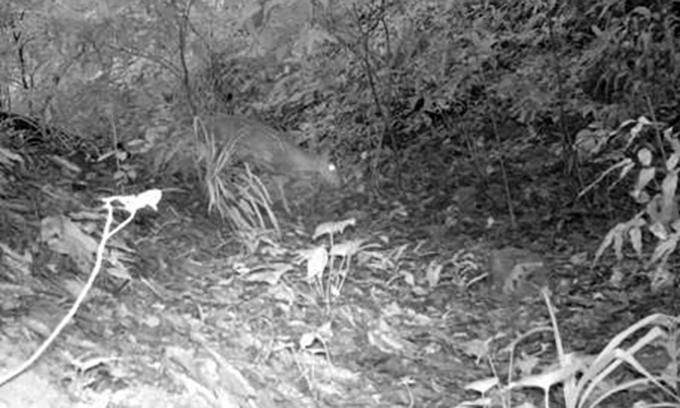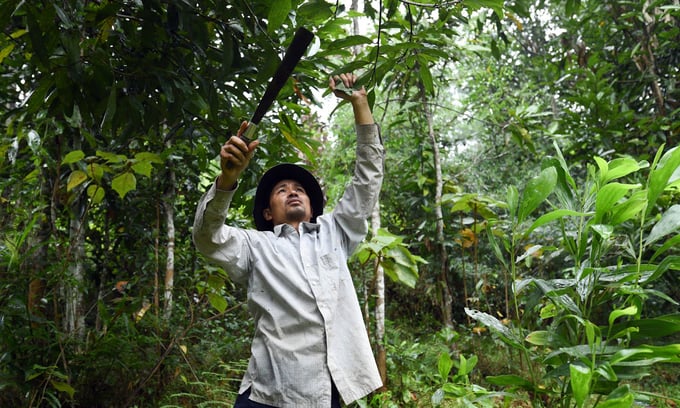May 24, 2025 | 16:22 GMT +7
May 24, 2025 | 16:22 GMT +7
Hotline: 0913.378.918
May 24, 2025 | 16:22 GMT +7
Hotline: 0913.378.918

Each ranger carries compact luggage and enough equipment for about 5-7 days of patrol in the forest. Photo: Tung Dinh.
The limestone mountains appear to stop on the side of the Tam Diep mountain range, after only one hour's drive from Thanh Hoa city to the southwest. Ngo Xuan Thang, Deputy Director of the Management Board of Xuan Lien Nature Reserve, said with great excitement, "The 24,000-ha reserve is so unique because it is the most significant place in Tonkin that retains the ecosystem of evergreen broad-leaved forest on the low mountain".
From the top view, the entire Xuan Lien Nature Reserve premise appears teeny-tiny in the heart of the Central low mountain region. The mountain range stretches from Sam Neua (Laos) to Thuong Xuan then Nhu Xuan, creating several significant mountain peaks like Ta Leo (1,400 m), Pu Gio (1,620 m), and Pu Hon (1,208 m), among others.
Until 2019, Xuan Lien Nature Reserve documented 1,228 vascular plants from 659 genera, 181 families, and 5 phyla. Many of these species, including selasian wood, cunninghamia konishii, fokienia, and madhuca pasquieri, are listed in Vietnam's Red Book.

GPS devices are used by forest rangers during the forest patrolling. Photo: Tung Dinh.
"We have used the GPS-Photo Link app to record rare and ancient tree species such as yunnan cypress, fokienia, cunninghamia konishii, madhuca pasquieri, and others for close monitoring and management. We even use valuable wooden roots as landmarks to mark sub-zones," Thang explained.
The deputy director took the team to Hon Can Ranger Station to check out the ranger force's "technological friend". Thang took the crew on a random route through the forest to assess the woodland's actual state.

The Roosevelt's muntjac is recorded at Xuan Lien Nature Reserve.
Thang called for the team of Nguyen Van Binh, a resident of Quang village (Van Xuan commune) to instruct them on how to utilize GPS in practice. People in the village use sharp stakes and ropes to divide the forest into 1,000m2 small plots in order to calculate and measure the radius of the trees and press the coordinates.
People like Binh now consider patrols to be their daily work. Some of them even wonder whether they will be able to count all the trees in Xuan Lien forest until the end of their lives. "A day without visiting my inheritance makes me feel like something's missing," he said. And when Binh learned how to "count the treetops" and realized how valuable his "treasure" was, he fell even more in love with the 5 layers of evergreen forest.
Thang stated that even on the hottest of days, the temperature in the forest patrol area seldom rises above 40oC. With an average annual rainfall of over 2,000mm and air humidity always between 85 and 86%, Xuan Lien becomes home to 1,811 species of animals, 29 of which are internationally vulnerable and listed on the IUCN Red List, and 50 of which are listed in the Vietnam Red Book.
Mr. Thang picked up wild vegetables with his hand and slowly talked about the typical and endemic species of Xuan Lien such as the white-cheeked gibbon, gray langur, Roosevelt's muntjac, red-faced spider monkey, Northern Cuora galbinifrons. He has seen some species, but the majority of them can only be viewed in the wild through images captured in heat traps.

Forest patrol and protection are currently contracted to many households living in the buffer zone. Photo: Tung Dinh.
The finding of Roosevelt in 2012 and 2013 is the most unforgettable memory for Xuan Lien environmentalists. At the time, the Center for Natural Resources and Environment Research and reserve employees spent several years wading through the forest to confirm the existence of two species of gills found in Xuan Lien, the common muntjac and Roosevelt's muntjac.
These two species were previously identified in the 1990s in the area next to Xuan Lien Nature Reserve - Pu Hoat Nature Reserve, Nghe An. However, due to a lack of information, Roosevelt's muntjac was mistakenly described as a new species and named Pu Hoat muntjac for a long time.
It wasn't until the 2012 investigation, when scientists compared the skulls collected at Xuan Lien to those kept at the American Museum of Natural History and the Chicago Field Museum of Natural History, as well as the genetic sequencing of dozens of genetic samples obtained in Xuan Lien, Pu Hoat, that scientists came to the conclusion, reaffirming Pu Hoat muntjac is the Roosevelt's.
Xuan Lien's conservation work also demonstrated effectiveness when increasing the number of white-cheeked gibbons from 41 herds of 129 individuals (by 2013) to 62 herds of 200 individuals (by 2020), and 8 groups of gray langurs with approximately 151 - 224 individuals identified.
Furthermore, two new plant species have been discovered here: one belonging to the Aristolochiaceae family and scientifically named Aristolochia xuanlienensis (Xuan Lien wood incense); the remaining species belong to the genus Giac Di - Annonaceae family and are awaiting DNA analysis results.
After various changes, the Xuan Lien Nature Reserve now manages 24,728.6 hectares of forest and forestry land, of which 23,816.23 ha is special-use forest and 912.37 ha is designated for production forest. Natural forests cover nearly 97% of Xuan Lien.
After planning three types of forests in Thanh Hoa province from 2016 to 2025, the reserve's production forest land expanded by 92.77ha. The reserve's functional subdivisions are separated into relatively adjacent sections that are thought to be convenient for management and preservation.
Translated by Linh Linh

(VAN) The People's Committee of Tra Vinh province has approved an adjustment to the investment policy for the Green Hydrogen Plant project, increasing its area to approximately 52.76 hectares.
![Reducing emissions from rice fields: [2] Farmers’ commitment to the soil](https://t.ex-cdn.com/nongnghiepmoitruong.vn/608w/files/news/2025/05/05/dsc08881jpg-nongnghiep-140632.jpg)
(VAN) Clean rice cultivation model in Thuong Tan commune, Bac Tan Uyen district, is assisting local residents in achieving sustainable agriculture by substantially reducing costs, increasing productivity, and protecting the environment.

(VAN) At the conference to disseminate Resolution No. 68, AgriS introduced its digital agricultural ecosystem and reaffirmed its commitment to accompanying the Government in promoting private sector development and sustainable agriculture.

(VAN) 'Blue Ocean - Blue Foods' initiative is designed to restore marine ecosystems and establish sustainable livelihoods for local communities by cultivating a minimum of 1,000 hectares of cottonii seaweed in the first three years.
/2025/05/21/4642-3-112707_603.jpg)
(VAN) The V-SCOPE project has made direct contributions to three out of six pillars of the Comprehensive Strategic Partnership between Vietnam and Australia.

(VAN) Facing the threat of rabies spreading to the community, Gia Lai province urgently carries out measures to vaccinate dogs and cats on a large scale.

(VAN) Disease-free livestock farming not only protects livestock herds but also stabilizes production and livelihoods for many farmers in Tuyen Quang.